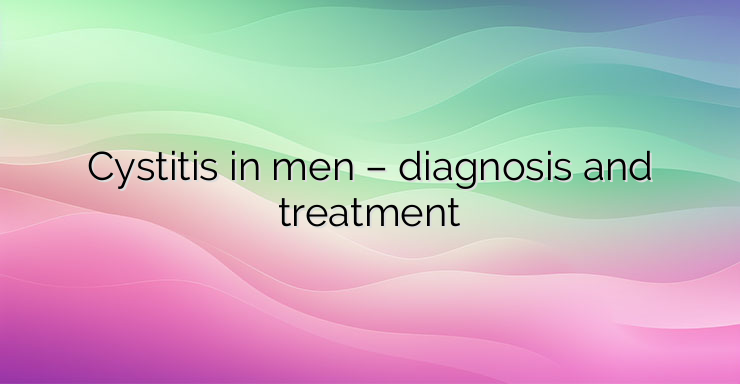Cystitis is an inflammation of the lining of the bladder wall. Although it is more unusual for men, they can also develop cystitis. When it occurs, cystitis in men is usually a temporary condition that can be treated with antibiotics or home remedies. It is important to consult a doctor if symptoms do not improve within a few days. Who is at greater risk of developing cystitis? Men are generally not at high risk of developing cystitis. This is largely due to their anatomy. The male urethra is longer, which means bacteria entering it must travel a greater distance to reach the bladder. However, there are factors that can predispose men to developing cystitis, these include: Sexual activity involving the penis; Use of a urethral catheter; Enlarged prostate; Conditions that weaken the immune system, such as HIV or diabetes; Refraining from urinating for long periods of time; Bladder stones; How is cystitis diagnosed in men? There are various tests that are used to diagnose cystitis, which include: Urinalysis In this, the patient provides a sample of urine that is analyzed by a laboratory to be tested for the presence of bacteria, as well as to find out what type of bacteria is causing the infection. Cystoscopy Cystoscopy involves the use of a long, thin, tube-shaped instrument that has a small camera and light source that is used to view the inside of the bladder. This allows the doctor to check for signs of inflammation or infection. It is also possible to take a tissue sample (biopsy) during the examination. Imaging studies With symptoms of cystitis, ultrasound or radiography may be prescribed. They allow the tissues and structures around the bladder to be examined to see if some other condition is causing the complaints. How is cystitis in men treated? In some cases of cystitis, it goes away on its own in a short period of time. However, if there is an infection that does not go away, antibiotics may need to be prescribed. There are also some recommendations that can be implemented at home to relieve symptoms and prevent future cases of cystitis: Take nonsteroidal anti-inflammatory drugs (NSAIDs), such as ibuprofen or acetaminophen to reduce pain and inflammation. There is some evidence that drinking cranberry juice (which does not contain added sugars and preservatives) may help with cystitis, although there is insufficient scientific evidence to support cranberry’s beneficial effect on the condition. Cranberry juice should not be consumed if the patient is taking a blood thinner such as warfarin, as it may cause bleeding. Drinking plenty of water is helpful to keep the body hydrated.as well as help to clear the microorganisms. Frequent urination has a good effect on the infection. Also, it is recommended to urinate immediately after intercourse, as this prevents infection from occurring. When bathing, the genital area should be carefully cleaned with warm water only. If soap is used, it should be natural, without fragrances and perfumes or dyes to avoid irritation. No colognes or perfumes should be used on the penis. The chemicals in these products can irritate the genital skin and increase the risk of cystitis. Bibliography: National Health Service (NHS). Cystitis Arora HC, et al. The enigma of men with interstitial cystitis/bladder pain syndrome Castle EP. What are the symptoms of bladder infection in men?


Leave a Reply